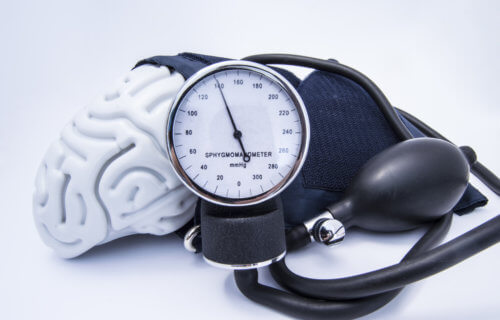SACRAMENTO, Calif. — Your future self will thank you if you start taking steps towards lowering your blood pressure today. New research suggests that having high blood pressure in your 30s makes it more likely you’ll experience failing brain health in your 70s. Simply put, keeping your blood pressure in a normal range may help stave off brain conditions such as Alzheimer’s disease, the most common form of dementia.
The findings come from looking at brain scans of older adults who had a history of high blood pressure when they were 30 to 40 years-old with older adults who had normal blood pressure at that age. The high blood pressure group showed lower brain volumes and defects in their white matter. Both of these brain changes have a connection to dementia onset.
Men were also more likely to experience harmful brain changes than women. Men with high blood pressure in their 30s showed more decreases in gray matter volume and frontal cortex volume. The authors explain that the high levels of estrogen women have before menopause may protect the brain from the effects of high blood pressure.
“Treatment for dementia is extremely limited, so identifying modifiable risk and protective factors over the life course is key to reducing disease burden,” says first author Kristen M. George, an assistant professor in the department of public health sciences at UC Davis, in a university release. “High blood pressure is an incredibly common and treatable risk factor associated with dementia. This study indicates hypertension status in early adulthood is important for brain health decades later.”

Researchers studied the data from 427 people participating in two other studies involving healthy aging. The health information from these patients examined a period from 1964 to 1985. These individuals had their blood pressure taken between the ages of 30 and 40 years to see if they had high blood pressure, were at risk for high blood pressure, or had normal blood pressure. The same group also received MRI scans between 2017 and 2022 to look for any signs of neurodegeneration or other brain abnormalities.
Both men and women with high blood pressure showed significant decreases in gray matter, though the changes were more common among men. People at risk for high blood pressure also displayed lower cerebral gray matter, frontal cortex volume, and fractional ansiotropy (a measure of brain connectivity).
“This study truly demonstrates the importance of early life risk factors, and that to age well, you need to take care of yourself throughout life—heart health is brain health,” says Rachel Whitmer, the senior author of the study and professor at UC Davis.
There are some limitations to the study. The small sample size prevented the authors from examining racial and ethnic differences when looking at the results. The MRI scans also took place once, which does not provide evidence of when neurodegeneration began to occur.
Approximately 47 percent of American adults have high blood pressure — which refers to anything above 130/80 mmHg. There are several factors that influence the likelihood of developing high blood pressure. About half of men have high blood pressure compared to 44 percent of women. By ethnicity, high blood pressure is the highest amount Black adults and the lowest among Hispanic adults. Additionally, African Americans between the ages of 35 and 64 are 50 percent more likely to have high blood pressure than Whites of the same age range.
The study is published in JAMA Network Open.


Correlation and causation are not the same thing. I would be curious to see if there was a link between the reduced brain function and the drugs the people took for their high blood pressure.
Maybe 40 years of high blood pressure medication has something to do with it.
Yeah. Put more anxiety on people at their physical peak. Way to go.
Of course, the blood pressure standards were markedly higher in 1985 so people likely were not getting diagnosed as having “high blood pressure” so they were left untreated.
The medical industry also loves to diagnose from hard numbers, like 130/80. I’m pretty sure my body has no concept of how humans use numbers so why is 133/81 considered high BP but 129/79 is not? Let’s not even get into how a one-tenth change in A1C levels leads to a change in a diabetes or pre-diabetes diagnosis. Sheesh.